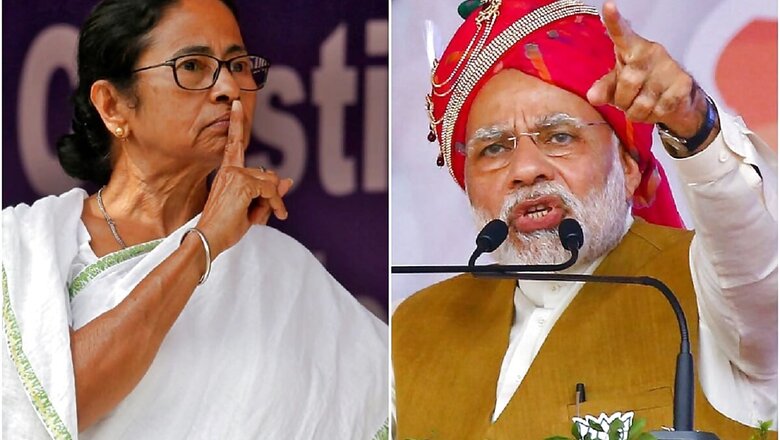
views
Slogans like “2 Mai, Didi Gayi” (May 2 Didi is leaving) and “200 Paar” (we will cross 200 seats) reverberated in Bengal during the Bharatiya Janata Party’s campaigning for the assembly elections. Now, on counting day, Trinamool Congress leader Mamata Banerjee has answered them. The incumbent chief minister is headed towards a historic win in the state, with her party leading in 210 seats around 4.30pm on Sunday, a win which will impact national politics in the run-up to the 2024 Lok Sabha polls.
On the face of it, the TMC had its backs to the wall this time given public resentment and anger against the party on the issues of cut-money, corruption and lawlessness and many senior leaders deserting her for the BJP. But the Trinamool managed to turn the sentiment around on the face of Banerjee, projecting her as the sole woman fighting the “big BJP men from Delhi”, invoking Bengali pride, the insider-outsider card and rallying the women and Muslim voters in its favour. The BJP, which had the momentum in Bengal since the 2019 Lok Sabha elections, failed to tap the anti-incumbency sentiment against Banerjee, given a sheer lack of organisation on the ground. As a result, the BJP which led in 121 assembly segments in Bengal in 2019, and thought the anti-incumbency push will take it beyond 147-mark, had dropped below 80 seats around 4.30pm in a major blow to it.
Turning points
There were two clear turning points in the election. One was Banerjee’s injury sustained in Nandigram on March 10 after which she began her campaign on a wheelchair and blamed the BJP for the trauma. Though the BJP made light of her injury as a “sympathy-gaining drama”, the image seems to have worked on the ground especially amongst the women voters with Banerjee “the fighter Didi” being projected as the one who was under attack. Her iconic image of sitting alone on a dharna in Kolkata for several hours after a one-day ban by the Election Commission further reinforced the perception that she was under attack from all sides and had been left alone. In an interview with News18 last month, senior TMC leader Sovandeb Chattopadhyay had said Prime Minister Narendra Modi’s “Didi-o-didi” remark was a “nasty comment unacceptable to women and the results would prove how women have rallied behind Banerjee”. The BJP, which made some big promises for women and girls in its manifesto, was not able to communicate them on the ground due to lack of organisation and Banerjee’s existing women-welfare schemes like Kanyashree still rung a bell. Women voters across religious lines seem to have voted for her.
The second major turning point was the Sitalkuchi firing incident on the day of the fourth phase of polling when four Muslim boys were killed in poll-related violence in firing by central security forces. This incident gave Banerjee a chance to rally the Muslim voter behind her and she went to Sitalkuchi to give the message that she was the sole saviour of the community. In doing so, the impact of the Left-Congress-ISF combine in Muslim-dominated districts like Malda, Murshidabad and Dinajpur was completely negated and the TMC for the first time has won a record number of seats in these districts. In fact, an audio tape released by the BJP of a conversation between the CM and the TMC candidate in Sitalkuchi to “play politics over the bodies”, as BJP described it, only worked in the favour of the Trinamool Congress as its message reached the Muslims that voting for the Third Front meant bringing the BJP into the state. News18 has learnt that the Congress disappearing from the campaign in Malda, Murshidabad and Dinajpur subsequently, where it had won 26 seats in 2016, also seemed like an understanding between it and the TMC to avoid a division of Muslim votes. The Congress looked set to draw a blank in Bengal. The Left and ISF got decimated with the disappearance of the Congress. The Congress in fact seems to have done the biggest favour it could do to the TMC by stepping out of the picture in these districts, as the BJP was depending on the Third Front to hurt Banerjee here.
Lack of organisation, no CM face
Though the BJP made claims that it has committees on 85% of the booths in the state and had made rapid progress in building up its organisation in Bengal, the same did not reflect in the villages where an odd BJP flag and poster was present but there was a lack of local leaders. The TMC instead was a well-oiled machine, specialising in the “last-mile delivery of the vote” when it mattered while the BJP did not have the boots on the ground to encash the disillusionment that many people felt with the Trinamool. A senior TMC leader told News18 that the BJP’s ground strength in Bengal was not like in Uttar Pradesh, Bihar or Madhya Pradesh and this is where the Trinamool Congress always had the edge. Due to that, the BJP was unable to inspire confidence in people that it would come to power. While the BJP said it could work on the 2019 gains to come to power in West Bengal now, it seemed clear that the state was not that easy to win. The TMC itself took 12 years to dislodge the Left government in 2011 after Banerjee lost two elections. The BJP thought it could do so in a matter of two years given the Modi factor but it was not to be.
The West Bengal polls also raise a question over the BJP’s strategy of not going with a CM face in a state election when it is faced with a mercurial incumbent, like Arvind Kejriwal in Delhi or Mamata Banerjee in West Bengal. Sensing this after his experience of working with Kejriwal in the last Delhi elections, poll strategist Prashant Kishor made Mamata Banerjee the only face in the campaign material of TMC, putting the party in the background, which proved to be a smart move as the BJP failed to project any dominant local face that would stand in challenge to her. In the end, top BJP leaders were holding rallies while speaking in Hindi even as Banerjee made it a point to speak in Bengali at rallies. Most senior leaders of the BJP who contested the election, including MPs, are struggling to win their seats. The urban voter seems to have not left Banerjee’s side given how she blamed the Centre for the Covid second wave and spread in the state lately.
Way forward
This loss will be a big disappointment for the BJP’s top leaders and especially Amit Shah as he invested a lot of political capital to win Bengal. The present BJP under Narendra Modi is not a party to seek any moral victories in the event that it ends up with about 80 seats, up from just three in 2016 as the party knows well that it had led in 121 assembly segments just two years ago and this result is nothing short of a big setback. Mamata Banerjee, however, lost the Nandigram seat to her former close associate Suvendu Adhikari in a tight contest. The BJP may point this out, but besides these games of one-upmanship, it is now clear that the saffron party is the main opposition in West Bengal and needs to work more on the ground to wrest the state after five years. It would however be more concerned immediately over a buoyed Banerjee’s attempt to forge a united front against the BJP at the national level ahead of the 2024 elections and her resolve to fight against the PM from the Varanasi seat then. The West Bengal win opens up a new discourse at the national political level with the possibility of Banerjee being a rallying force against Modi.
Read all the Latest News, Breaking News and Coronavirus News here. Follow us on Facebook, Twitter and Telegram.















Comments
0 comment